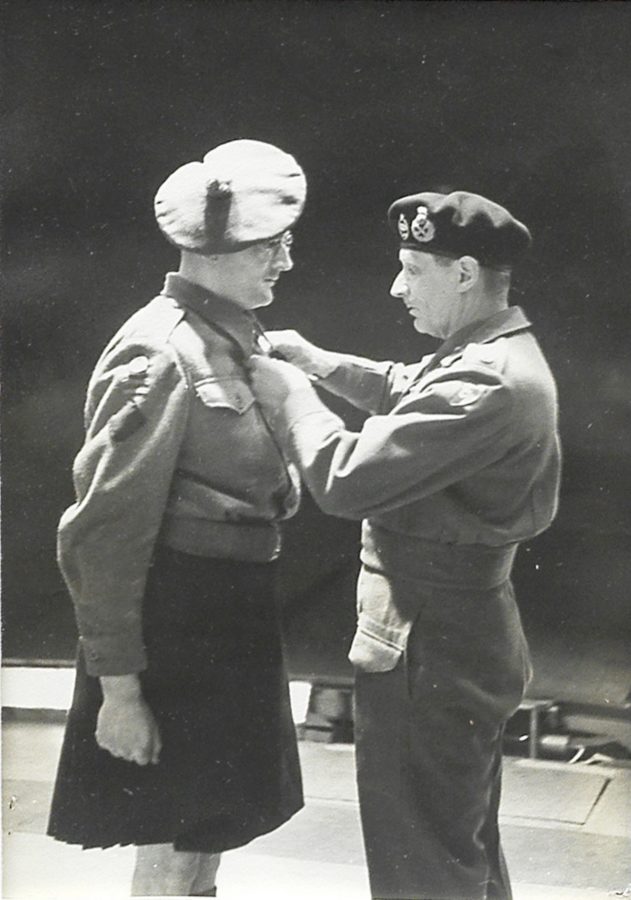World War II bravery medal sells at auction
The son of an heroic Scots World War II stretcher bearer has spoken of his pride after his father’s medal for bravery in saving the lives of wounded comrades in the middle of a minefield was sold at auction.
Private John Bell of the Highland Light Infantry won the Military Medal (MM) for his gallantry in battle at Boersteeg, near the German Border, on 8 February 1945.
One of five stretcher men severely wounded in mine blasts after two had initially gone to help an injured German, he went from man to man administering life saving aid and ensured each one was carried to safety before he accepted aid for his own multiple wounds.
In his citation, Bell, from Leith, Edinburgh, was praised for acting “with complete disregard for his own safety” and setting “a splendid example to all ranks”.
Bell’s prized medal, presented to him by Field Marshal Montgomery, was among the highlights in Bonhams’ online Spring Home & Interiors Sale this week, where it fetched nearly £1,800.
The silver medal, inscribed “for bravery in the field”, was sold by his son Ian together with his late father’s prized letter of congratulations signed by King George VI at Buckingham Palace.
Mr Bell, 77, from Edinburgh, said afterwards: “My dad never spoke about his experiences in the war, but his Military Medal is something I’ve always had, up on my wall in a frame.
“I’m very proud of my dad but until now very few people were aware of what he did. The story of how he won the Military Medal is like something from a Hollywood film but it had never been told.
“By putting his medal up for sale at Bonhams I’ve had an opportunity to share his story and how he won it.
“In a way I’m sad to part with it but I’m very pleased to know it will be well looked after in its new home. It would be nice to think it might one day be displayed.”
Pte Bell’s citation reads: “During the attack on Boersteeg on the morning of February 8, 1945, two stretcher bearers went to pick up a wounded German lying near the railway track. In doing so, one of them stepped on a mine, severely wounding both.
“Private Bell and the remaining company stretcher-bearer at once went to their assistance, but he also stepped on a mine, which wounded both. A fifth stretcher-bearer trying to reach them was blown up and wounded.
“Private Bell, although suffering from multiple wounds, insisted on dressing all the wounded men and, in spite of knowing that he was in a dense anti-personnel minefield, moved from one to the other with complete disregard for his own safety.
“He completed all dressings but refused to allow himself to be attended to until he had seen that all the wounded had been carried clear of the minefield and evacuated by jeep. By this time he was suffering from shock and had to be evacuated by stretcher in a state of collapse.
“During this time enemy defensive fire was falling in the vicinity.
“The bravery and devotion to duty displayed by Private Bell may well have saved the lives of at least two of his comrades who were severely wounded and also set a splendid example to all ranks.”
Kenneth Naples, of Bonhams, said: “Private Bell’s Military Medal is evidence of his extreme bravery and selflessness on the battlefield. Bell and the other stretcher bearers went to the aid of a German soldier deep in a minefield and were wounded themselves.
“Despite his own injuries, and the obvious dangers all around, Bell dressed their wounds and ensured they were all safely evacuated before he accepted assistance for his own wounds.
“We had a steady stream of interest, and we are delighted that the medal will continue to be treasured.”
The Military Medal was awarded to personnel below commissioned rank for “acts of gallantry and devotion to duty under fire”. The award was replaced by the Military Cross in 1993.
